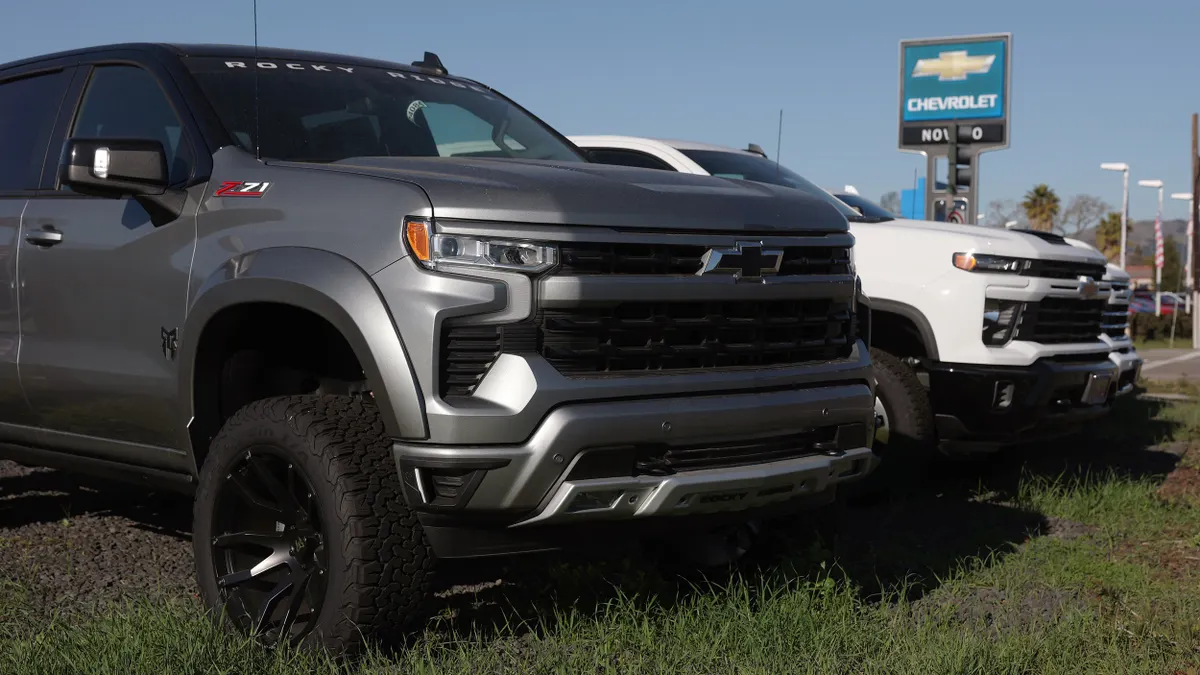Dive Brief:
- General Motors expects the electric vehicle market to be “pretty choppy” in the near future, in part due to the ending of a $7,500 federal tax credit for electric vehicles in September. But once demand has normalized, the automaker anticipates that the “EV market is going to stabilize from a supply standpoint,” CFO Paul Jacobson said Tuesday.
- “We had a number of competitors out there that really were selling EVs for whatever they could get for them because they really wanted to get the credits on the environmental side,” he said in response to analyst questions during the company’s third quarter earnings call. “So we do think it will be a more stable environment.”
- GM has actively managed its EV inventory down by about 30% since the end of its second quarter, Jacobson said, according to a transcript. The Detroit-based automaker is also taking steps to navigate through the period of EV demand constriction it anticipates will continue into 2026; “throughout this period, you can be assured that we will build to demand and continue to focus on improving EV profitability, including through material cost reductions by leveraging larger module sizes and new battery chemistries,” he said.
Dive Insight:
EV sales hit an all-time high in Q3 as consumers raced to take advantage of the federal tax credit before it ended on Sept. 30, reaching 438,487 units sold, Cox Automotive said in an Oct. 10 press release, citing Kelley Blue Book estimates. EV sales represented a record 10.5% of total vehicle sales for the quarter, up from 8.6% in the prior year period, according to Cox.
Companies including Ford, Hyundai and Kia all reported record EV sales in September, with Ford reporting its best quarter for EVs, Cox said in an Oct. 2 release.
Major automakers, including GM, have already begun to prep for the impact of the credit’s end. In September, Ford CEO Jim Farley said he expected the close of the incentive to slash EV demand by roughly half, noting hybrid vehicles may be more acceptable to consumers, according to a report by CNBC.
Elon Musk-owned Tesla, meanwhile, has introduced new models with more affordable prices in a bid to increase overall sales, coming as the top seller of EVs in the U.S. faces questions over profitability and rising competition in the EV space prior to the release of its third quarter results, USA Today reported.
Prior to its Q3 earnings report, GM reported losses of $1.6 billion “on a planned strategic realignment of our EV capacity and manufacturing footprint to consumer demand” following U.S. policy changes — including the EV credit as well as changes in emission regulations, according to an Oct. 14 securities filing.
Following in the wake of several of its competitors, GM also reported record EV sales for its third quarter ended Sept. 30, with 67,000 deliveries and a 16.5% market share, Jacobson said Tuesday, solidifying its place as the second largest seller of EVs in the U.S. by volume after Tesla. However, the automaker has already seen a “significant pullback” in EV demand for October, Jacobson said, a trend it anticipates will continue through early next year before “we see what the natural demand is for EVs,” he said.
GM is also fielding the impact of ongoing economic headwinds, including tariffs. For the third quarter ended Sept. 30, the company reported total adjusted EBIT of $3.4 billion, down $700 million YoY, Jacobson said — including a gross tariff impact of $1.1 billion.
However, the company’s gross tariff impact expectation for 2025 has improved from its original $4 billion to $5 billion range, to between $3.5 billion to $4.5 billion, Jacobson said during the call, in part due to Friday adjustments made by the Trump administration to medium and heavy-duty vehicle imports.
Such adjustments will help to support GM’s “tariff mitigation in 2026 and beyond while we work to adjust our supply chains,” Jacobson said.
For its third quarter, GM reported revenue of $48.5 billion, compared to $48.7 billion for the prior year period, according to its earnings release. Net income attributable to shareholders, however, plummeted to $1.3 billion, approximately a 57% drop from the nearly $3.1 billion reported in Q3 2024.
The automaker also adjusted its full-year guidance, now anticipating net income between $7.7 billion to $8.3 billion, narrowed from the previous range of $7.7 billion to $9.5 billion.












